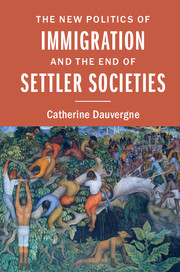Book contents
- Frontmatter
- Contents
- Acknowledgements
- Preface
- 1 Introduction
- 2 Settler societies and the immigration imagination
- PART 1 THE END OF SETTLER SOCIETIES
- PART 2 THE NEW POLITICS
- 6 Why economics and human rights are not enough
- 7 The loss of settlement and society
- 8 The close of the post-colonial
- 9 Contours and consequences of a new politics
- 10 Imagining immigration without a past – stories for the future
- Appendices
- Bibliography
- Index
9 - Contours and consequences of a new politics
from PART 2 - THE NEW POLITICS
Published online by Cambridge University Press: 05 March 2016
- Frontmatter
- Contents
- Acknowledgements
- Preface
- 1 Introduction
- 2 Settler societies and the immigration imagination
- PART 1 THE END OF SETTLER SOCIETIES
- PART 2 THE NEW POLITICS
- 6 Why economics and human rights are not enough
- 7 The loss of settlement and society
- 8 The close of the post-colonial
- 9 Contours and consequences of a new politics
- 10 Imagining immigration without a past – stories for the future
- Appendices
- Bibliography
- Index
Summary
The demise of settler society values and the departure from twentieth-century patterns in Europe together ground the new politics of immigration and point to its future directions. This politics is front and center in prosperous Western liberal democracies, filling the headlines and parliaments. But its effects reach every corner of the globe as these states dominate the global policy arena by virtue of being both the world's most sought after migration destinations and the traditional terrain of migration mythology.
The transformation in the values that former settler states and former colonial masters are now pursuing in immigration leads to the competitive migration convergence that has been evident for at least a decade. Increasingly, the immigration laws and policies enacted by Western liberal democracies look alike. This is true whether those states were once settler societies or whether they are among the new nations of immigration in Europe. This truth in and of itself is a challenge to our immigration imagination – to conclude that immigration operates socially and politically the same way in the United Kingdom or Germany as it does in Australia or the United States is significant as it has never been true in any earlier era. The convergence is competitive – all of these states want to attract the same highly skilled workers, and the same agile economic actors, as permanent migrants. All of these states want to keep asylum seekers at arm's length, and to impose limits on family reunification. These goals are broadly shared, even if they are pursued with differing tactics, or alongside some diminishing vestiges of ethnic kinship preferences.
In part, the competitive convergence results from taking a “non-discriminatory” posture toward immigrants. The emergence of points systems as the preferred model for economic immigrant selection in Western liberal democracies demonstrates a commitment to ignore cultural, ethnic, and even racial values, and to instead embrace a quasi-scientific or at least “neutral” selection method. This method ensures that the same individuals will end up being top choice immigrants across a range of states. Points systems were invented by settler states seeking to break with their racialized immigration histories. The systems, however, do not remove discrimination, they simply deploy it differently. People who come out at the top of points systems are well educated, multi-lingual, economically successful, and young.
- Type
- Chapter
- Information
- The New Politics of Immigration and the End of Settler Societies , pp. 174 - 200Publisher: Cambridge University PressPrint publication year: 2016



